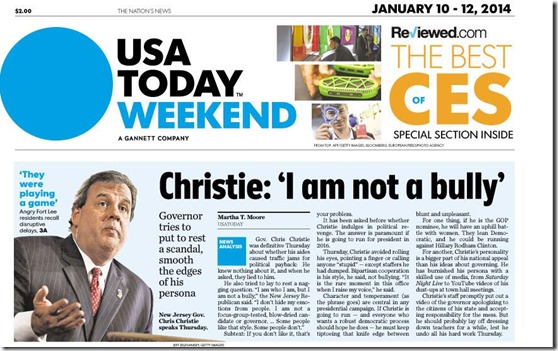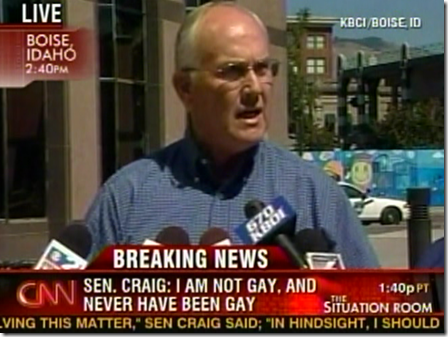I Am Not A Gay Lesbian Crook
I’ve written before about the dangers of uttering “quotes of denial,” in which the word “not” is placed immediately before a negative noun or adjective.
The problem is that the defensive-sounding negative word or phrase tends to linger longer in the public memory than the word “not.” So when Chris Christie uttered the phrase “I am not a bully” during his marathon press conference on Thursday, I knew it would be used against him.
Sure enough, here’s the cover from this weekend’s USA Today Weekend:
Christie should have known better, as history has provided us with numerous examples of bad—or downright disastrous—quotes of denial.
Here are eight memorable examples:
Richard Nixon, 1973: “I am not a crook.” President Nixon’s unfortunate phrase, uttered at the height of the Watergate scandal, became the five most famous words he ever spoke.
Bill Clinton, 1998: “I did not have sexual relations with that woman.” President Clinton stood by his denial for seven months until he finally admitted that he had, in fact, had sexual relations with Monica Lewinsky.
Kenneth Lay, 2001: “We’re not hiding anything.” The CEO and chairman of Enron knowingly misled the public about his company’s woeful financial condition. The company filed for bankruptcy shortly after his untruthful claim.
Larry Craig, 2007: “I am not gay.” After being arrested for lewd conduct in an airport men’s bathroom, Idaho Senator Larry Craig denied the accusation by telling reporters, “I am not gay. I never have been gay.” (I’m not suggesting there’s anything wrong with being gay, only that if Craig’s intent was to deny it, he chose the worst way to do it.)
John Edwards, 2008: “I know that it’s not possible that this child could be mine.” The Democratic presidential hopeful denied having a child with his mistress, Rielle Hunter. He later admitted that he is, indeed, the father.
Christine O’Donnell, 2010: “I’m not a witch.” Christine O’Donnell, the Republican Senate candidate from Delaware, had to do crisis control after a tape emerged of her saying a decade earlier that she had, “dabbled into witchcraft.” She took her critics on by releasing an ad that began with the words, “I’m not a witch.” The ad backfired, and she became fodder for the late night comics. She lost.
Oprah Winfrey, 2010: “I’m not a lesbian.” When the talk show host was asked about her relationship with close friend Gayle King, Ms. Winfrey tearfully denied the relationship was sexual. Her quotable quote was splashed across front pages worldwide. (I’m not suggesting there’s anything wrong with being lesbian, only that if Winfrey’s intent was to deny it, she chose the worst way to do it.)
Chris Christie, 2014: “I am not a bully.” Considering that Christie has made a career of incidents like this and this and this, his denial will only serve to reinforce his bullying nature.
How To Avoid The Language of Denial
In this video, I offer a tip for avoiding these types of “quotes of denial.”
Come join us for one of our fun, fast-moving and content-rich media and presentation training workshops! Click here to see our upcoming sessions.





Good piece, to which I’d add Fawn Hall’s famous assertion: “I’m not a bimbo.”
Marilyn,
That’s a great addition! I’ll add that to any follow-up pieces on the same subject. Thanks very much for reminding me of it!
Thank you,
Brad
I do like the advice on issuing a positive message like, “We always comply with the laws…”, but only when a clear denial of an incorrect assertion comes in the first few seconds of the statement. Anything else sounds like an admission.
Did you steal the money? – I wasn’t even there that day. (No denial)
Did Brand X cause those birth defects? – We rigorously safety test our products. (No denial)